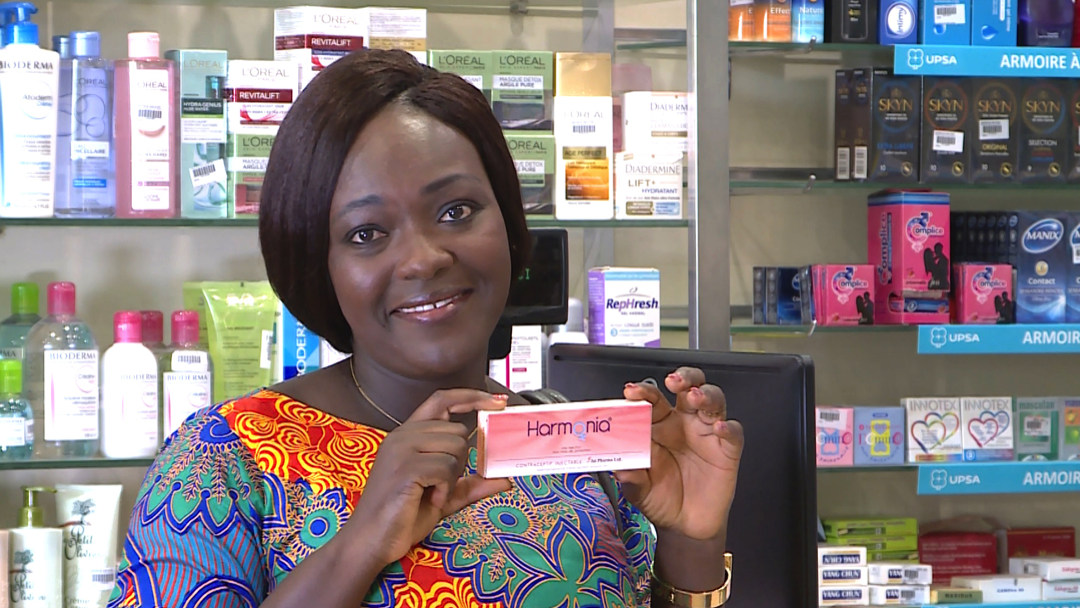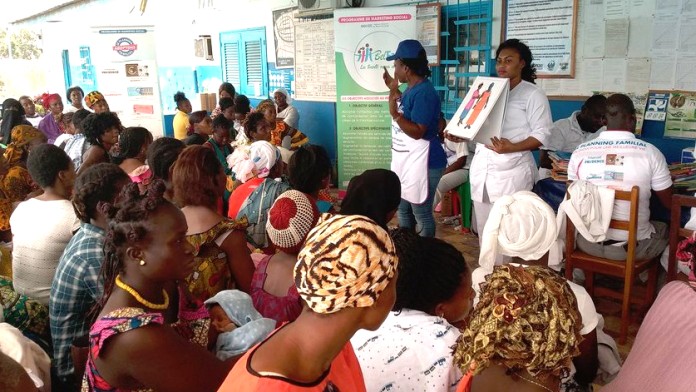

Women in Côte d’Ivoire have more children than they would ideally want. Ivorian NGO AIMAS provides education on autonomous family planning and protection against sexually transmitted diseases. It is supported in its work by KfW on behalf of the German Federal Government. Its success is clear to see; the prevalence of HIV has fallen significantly, and use of contraceptives has increased.
For young women and girls in Côte d’Ivoire, buying the pill at a pharmacy, a kiosk or from a village health worker is the preferred way to obtain modern contraceptives because, unlike in a state-run hospital, it allows them to remain anonymous. This is if they actually dare to buy it themselves and don’t leave this task, which is seen as embarrassing, to their partner or rely on them to provide condoms. In the past, women and girls in the West African country have not always had the necessary freedom to make their own decisions about family planning. Around one third of women say that they want to use contraception but they do not have any. Only one in seven women has used modern family planning methods. Religious beliefs and the traditional importance of having a lot of children limit women’s freedom to choose.
Around 30% of girls aged between 15 and 19 fall pregnant – and this is usually unplanned. Many women also resort to unsafe abortions, which pose a major risk to their health. Although Côte d’Ivoire is among the highest-performing countries in the region economically, its women have insufficient access to reproductive health services. The result: maternal mortality is high, while nearly 92 in every 1,000 children die before their fifth birthday and HIV prevalence is higher than in neighbouring countries.
However, the government has made the health sector a top priority. It has resolved to increase spending on health by 15% every year, aiming for it to account for 15% of GDP. KfW has been supporting the country on behalf of the Federal Ministry for Economic Cooperation and Development (BMZ) since 1995 and has promoted health-related projects there with a volume of around EUR 59 million to date. This has included various educational and awareness-raising activities implemented by AIMAS to encourage behavioural change. In entertaining radio adverts and through plays, the NGO provides information on issues around sexual health and autonomy. Social and digital media are being increasingly used for the educational activity, and they are also now being deployed to provide information about the COVID-19 pandemic and measures to limit its spread. AIMAS has a wide distribution network for contraceptives (social marketing), with coverage of underprivileged districts and rural areas. It includes kiosks and village health workers. Social franchising is also used to expand the range of quality-assured reproductive and sexual health services available to women and girls. A social franchise is a network made up primarily of private healthcare providers that offer family planning services under a common brand. Network participants benefit from joint training opportunities, products and marketing.
There have been successes: by 2018, 19.6% of people used some form of family planning. In 1995, the figure was just 4.3%. The prevalence of HIV dropped from 12% in 1995 to just 2.5% in 2018. The projects promoted by the Federal Government contributed significantly to these positive developments.
Because it promotes women’s autonomy, the project makes an important contribution to the achievement of SDG 5. KfW’s work to support rights-based family planning in partner countries has enabled around 30 million couples to protect themselves against unplanned pregnancy since 2011. KfW is active in this sector in eight countries and promotes two regional programmes that are being implemented in a further eight countries.
Share page
To share the content of this page with your network, click on one of the icons below.
Note on data protection: When you share content, your personal data is transferred to the selected network.
Data protection
Alternatively, you can also copy the short link: kfw-entwicklungsbank.de/s/enzBX_Yi
Copy link Link copied